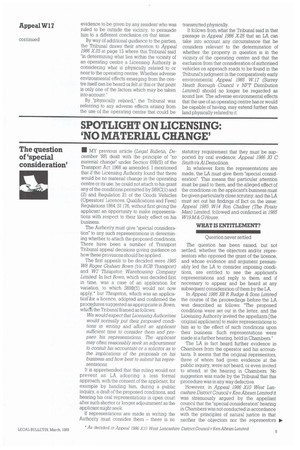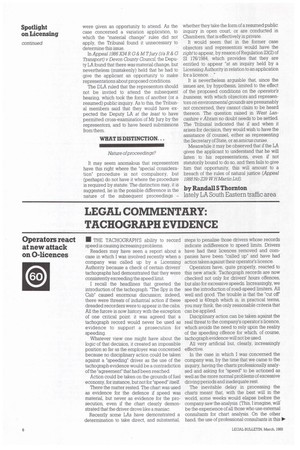SPOTLIGHT ON LICENSING: 'NO MATERIAL CHANGE'
Page 123

Page 124

If you've noticed an error in this article please click here to report it so we can fix it.
The question of 'special consideration'
II MY previous article (Legal Bulletin, December '88) dealt with the principle of "no material change" under Section 698(5) of the Transport Act 1968 as amended. I mentioned that if the Licensing Authority found that there would be no material change in the operating centre or its use, he could not attach to his grant any of the conditions permitted by S69C(1) and (2) and Regulation 21 of the Goods Vehicles (Operators Licences, Qualifications and Fees) Regulations 1984, SI 176, without first giving the applicant an opportunity to make representations with respect to their likely effect on his business.
The Authority must give "special consideration" to any such representations in determining whether to attach the proposed conditions. There have been a number of Transport Tribunal appeal decisions giving guidance on how these provisions should be applied.
The first appeals to be decided were 1985 W8 Roger Graham Bown (Va RGB Transport) and W7 Thrapston Warehousing Company Limited. In fact Bown, which was decided first in time, was a case of an application for variation, to which S69B(5) would not now apply,* but Thrapston, which was an applicationlor a licence, adopted and confirmed the procedures suggested as appropriate in Bown, whidh the Tribunal framed as follows: We would expect that Licensing Authorities would normally put their proposed conditions in writing and afford an applicant sufficient time to consider them and prepare his representations. The applicant may often reasonably seek an adjournment to consult his accountant or a solicitor as to the implications of the proposals on his business and how best to submit his representations.
It is apprehended that this ruling would not prevent an LA adopting a less formal approach, with the consent of the applicant, for example by handing him, during a public inquiry, a draft of the proposed conditions, and hearing his oral representations in open court after such shorter or longer adjournment as the applicant might seek.
If representations are made in writing the Authority must consider them there is no statutory requirement that they must be supported by oral evidence, Appeal 1986 XI C Smith t/a Al Demolition.
In whatever form the representations are made, the LA must give them "special consideration". This means that particular attention must be paid to them, and the alleged effect of the conditions on the applicant's business must be given particularly close scrutiny, and the LA must set out his findings of fact on the issue: Appeal 1985 W14 Ron Chalker (The Potato Man) Limited, followed and confirmed in 1985 W19 M & G Hou.se.
WHAT IS ENTITLEMENT? Question never settled The question has been raised, but not settled, whether the objectors and/or representors who opposed the grant of the licence, and whose evidence and argument presumably led the LA to consider imposing conditions, are entitled to see the applicant's representations and reply to them, and if necessary to appear and be heard at any subsequent consideration of them by the LA.
In Appeal 1986 X8 R Rudge & Sons Limited the course of the proceedings before the LA was described as follows: "The proposed conditions were set out in the letter, and the Licensing Authority invited the appellants [the original applicants] to make representations to him as to the effect of such conditions upon their business. Such representations were made at a further hearing, held in Chambers."
The LA in fact heard further evidence in Chambers from the operator and his accountants. It seems that the original representors, three of whom had given evidence at the public inquiry, were not heard, or even invited to attend, at the hearing in Chambers. No suggestion was made by the Tribunal that this procedure was in any way defective.
However, in Appeal 1986 XIO West Lancashire Distnct Council v Ken Abram Limited it was strenuously argued by the appellant council that the "special consideration" hearing in Chambers was not conducted in accordance with the principles of natural justice in that neither the objectors nor the representors were given an opportunity to attend. As the case concerned a variation application, to which the 'material change" rules did not apply. the Tribunal found it unnecessary to determine this issue.
In Appeal 1986 X34 RG&MT Jury (Va R & G Transport) v Devon County Council, the Deputy LA found that there was material change, but nevertheless (mistakenly) held that he had to give the applicant an opportunity to make representations about proposed conditions.
The DLA ruled that the representors should not be invited to attend the subsequent hearing, which took the form of another (or a resumed) public inquiry As to this, the Tribunal members said that they would have expected the Deputy LA at the least to have permitted cross-examination of Mr Jury by the representors, and to have heard submissions from them.
WHAT IS DISTINCTION. . . Nature ofproceedmgs?
It may seem anomalous that representors have this right where the "special consideration" procedure is not compulsory, but (perhaps) do not have it where the procedure is required by statute. The distinction may, it is suggested, lie in the possible difference in the nature of the subsequent proceedings whether they take the form of a resumed public inquiry in open court, or are conducted in Chambers, that is effectively in private.
It would seem that in the former case objectors and representors would have the right to appear, by reason of Regulation 23(2) of SI 176/1984, which provides that they are entitled to appear "at an inquiry held by a Licensing Authority in relation to an application for a licence.. ."
It is nevertheless arguable that, since the issues are, by hypothesis, limited to the effect of the proposed conditions on the operator's business, with which objectors and representors on environmental grounds are presumably not concerned, they cannot claim to be heard thereon. The question raised in West Lancashire v Abram no doubt needs to be settled. The Tribunal indicated that if and when it arises for decision, they would wish to have the assistance of counsel, either as representing the Secretary of State, or as amicus curiae.
Meanwhile it may be observed that if the LA gives the applicant to understand that he will listen to his representations, even if not statutorily bound to do so, and then fails to give him that opportunity, this will amount to a breach of the rules of natural justice (Appeal 1988 No Z39 W H Martin Ltd).
by Randall S Thornton lately LA South Eastern traffic area
































































































































